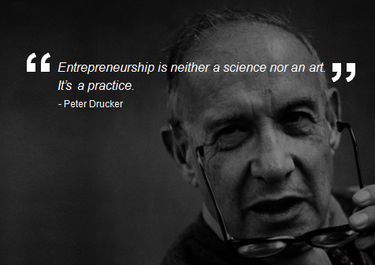|
My training philosophy is based on the realization that much information is already easily accessible related to things such as business planning, rules and regulations and those sorts of things we used to believe were useful starting points. Instead, my participants gain start up skills and confidence, focusing on learning and practicing ideation, business modeling and customer validation. As a student of Steve Blank's Lean LaunchPad Educator's Program, I'm a firm believer in getting it right before you start (measure twice, cut once.) As a graduate of the Price-Babson Symposium for Entrepreneurship Educators, I promote an environment of doing and experiencing rather than talking and telling. My programs range from one to five days and can be taught concurrently, or spaced over time. My sessions are fast-paced, interactive, focus on learning and doing and are unlike what you have seen before. Of the 600+ participants I've taught in the past three years, many have described them as kind of like experiencing a start up first-hand! Contact me directly if you'd like to learn more.
|
|
Entrepreneurship, as described by Peter Drucker, is neither a science nor an art, it’s a practice. As such, teaching entrepreneurship is not an easy task with some instead preferring to believe that entrepreneurship cannot be taught and others defaulting to teaching those start-up topics that only mask as useful, but do not come close to helping participants understand how to “do” entrepreneurship - eg. how to write a business plan (see also my post on Business plans.)
Fortunately, many have been able to draw a distinction between teaching entrepreneurship and teaching successful start-ups. There are, in fact, too many variables at play for anyone to presume that they can teach the successful start of a business. Entrepreneurship, on the other hand, is a skill set and mind set, a culmination of practices and processes that come together to help create an entrepreneurial mind capable of entrepreneurial action; this can be taught Entrepreneurship can be taught, but not in the way that you would teach many other subjects. Similar to teaching a sport, one cannot teach theory and not have the students of the game actually “do” the sport. Entrepreneurship educators must promote an environment of doing and experiencing rather than talking and telling. Content must focus on the principles and practices of creating good business ideas, establishing solid business models and learning how to validate their ideas and assumptions, prior to investing time, energy and resources into writing business plans, or worse launching their ventures too soon. The goal of entrepreneurship training should not be to teach a laundry lists of content that is easily gleaned from internet searches, instead it should focus on teaching skills and process, shaping attitudes, and instilling confidence. Like a sport, this can only be done by having participants “do” it in a safe, low risk environment prior to launching. |

